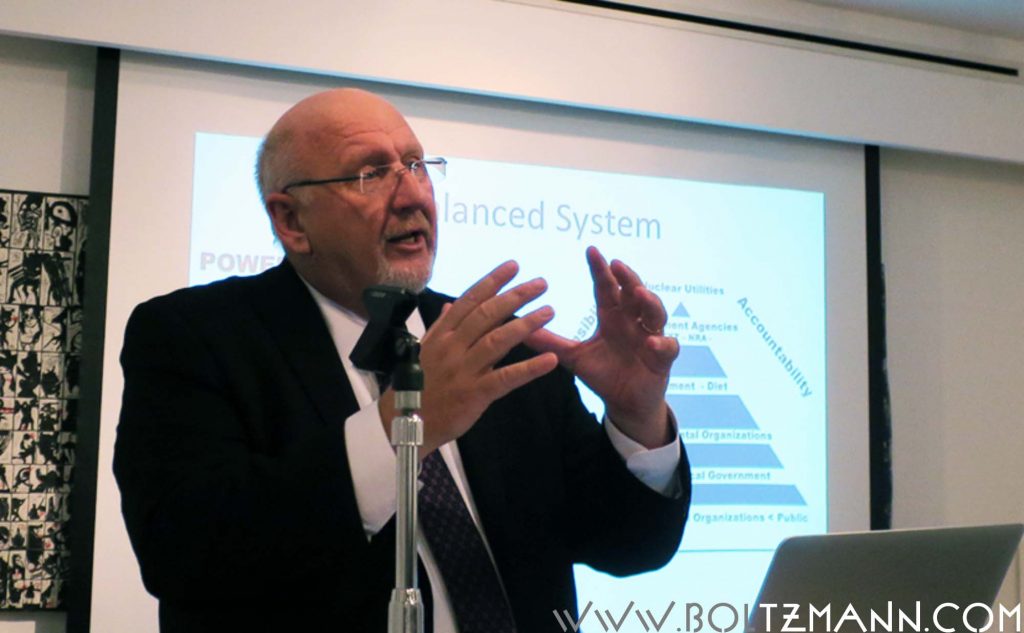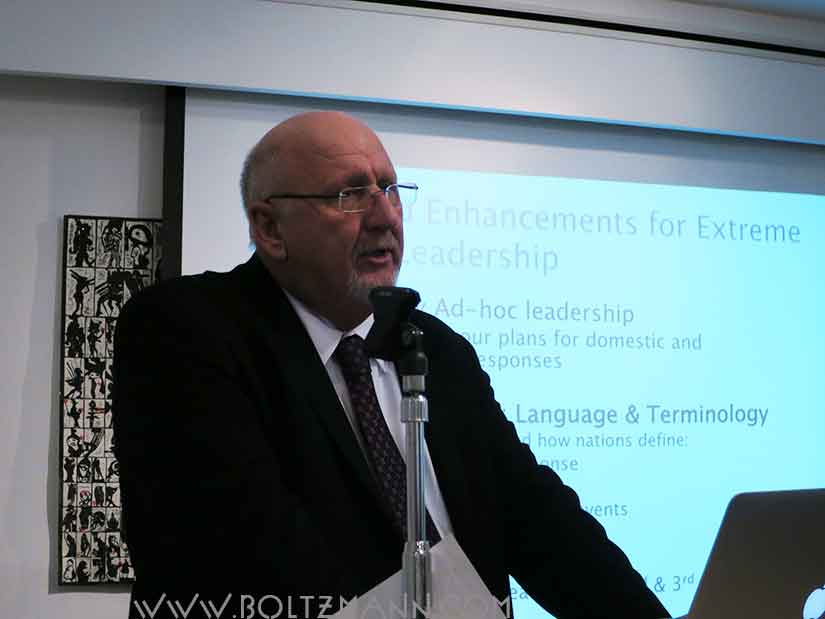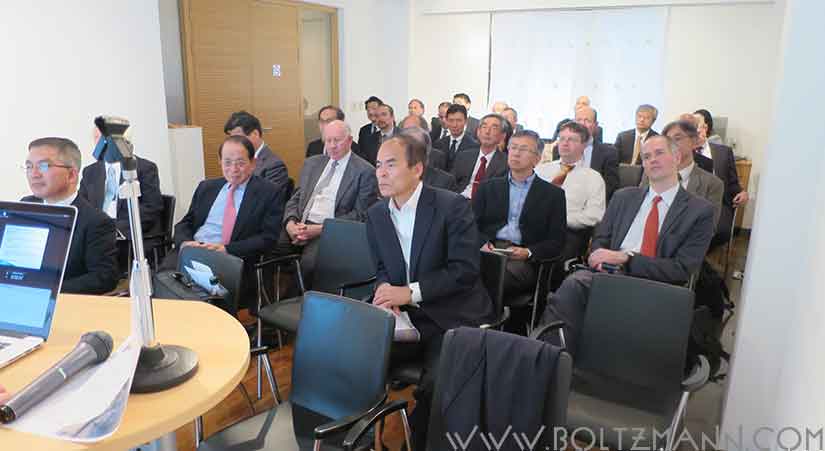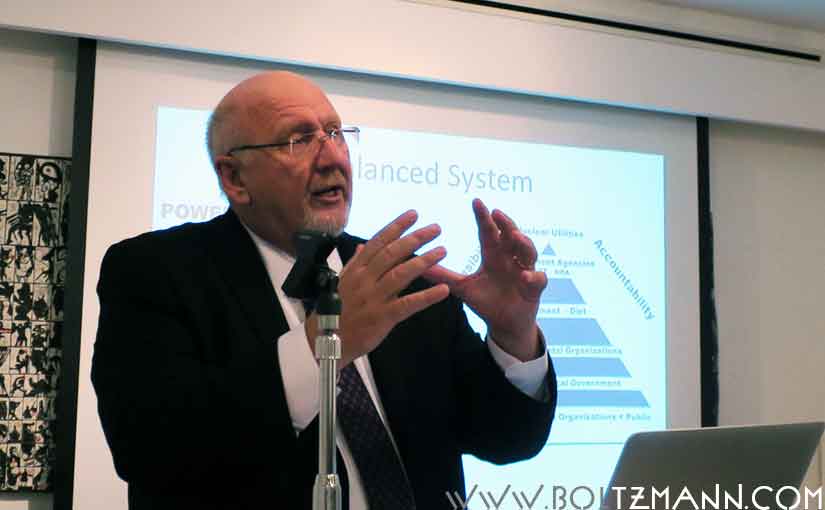Global leadership in the extreme: crisis leadership in post-Fukushima
Chuck Casto
keynote talk given at the 7th Ludwig Boltzmann Forum at the Embassy of Austria, Tokyo, 20 February 2015

by: Dr. Chuck Casto, Casto Group Consulting LLC, Licensed Nuclear Power Station Operator. Was NRC regulator responsible for 23 nuclear power stations. Leader of the US Integrated Government and NRC efforts in Japan during the Fukushima nuclear accident in 2011.
summary by Gerhard Fasol – discussions at the end of this page
Leadership in the Extreme
- The earth is flat enhanced global leadership is needed. A nuclear accident in one country is a nuclear accident everywhere.
- Japan – the Fukushima disaster revealed an imbalance of power and leadership:
- systems failure
- misalignment of values
- actions are needed to realign values
Needed enhancements for extreme crisis leadership, not only developing countries, but also including 1st world, developed countries such as Japan.
The USA are very experienced in assisting 2nd and 3rd world, developing countries in times of disaster and the response is essentially standardized. However, the Fukushima Dai-Ichi nuclear disaster was the first time, where the USA assisted a developed 1st world country in coping with a disaster.
The Fukushima Dai-Ichi disaster revealed the need to standardize our plans for domestic and international responses in times of disaster. We need to understand how nations define severe accident response, post-disaster recovery and preparations for extreme events.
Fukushima-Dai-Ichi was a system failure, a consequence of an imbalance of power and responsibility
Broken information flow
There was a lack of flow of information between government, utility and the public, and a lack of formal communication between the disaster site and the Government leadership – the disaster site was an isolated island.
Imbalance of power
This lack of sufficient information flow was compounded by imbalance of power and legal uncertainty. Several different laws and Government agencies applied, and there was confusion between Atomic Energy Basic Law, Emergency Laws, Basic Energy Plan, Industry Ministry (METI), Nuclear and Industrial Safety Agency (NISA), Self Defense Forces and other agencies.
There was confusion and conflicts over division of labor and responsibility, regarding venting of the reactors, injection of water and evacuation of local communities.
Imbalance of responsibility
There must be a clear legal basis for roles and responsibilities, which was not the case because of conflicts between different applicable laws (e.g. nuclear laws and emergency laws) and between different agencies and the utilities.
Ultimately the utilities (Tokyo Electrical Power Company TEPCO) must be responsible, however, the public and the government are reluctant to give the utilities the clear and sole responsibilty.
There is an uncertainty about “acceptable risk”. Risk management had been replaced by “Japan’s nuclear safety myth”, and preparations for nuclear accidents were not sufficient.
It is necessary to realign responsibility, accountability, power and achieve a balanced system
Japan needs to realign responsibility, accountability, power between:
- Government / Diet (Japan’s Parliament)
- Government agencies (MEXT, METI, NRA)
- Extra-Governmental Organizations
- Prefectural and local Government
- Nuclear utilities
- non-governmental organizations and the public
In particular, Government and Diet (Japan’s Parliament) need to exercise power, while the nuclear utilities must assume full responsibility and be fully accountable.
The nuclear regulator must be fully accountable to the Diet (Japan’s Parliament), and the Diet must assume the responsibility to supervise the nuclear regulator.
A public discussion on national level must determine which risk is acceptable, and the regulator must regulate to this acceptable risk, and be supervised by the Diet.
Questions and Answers
Question by Shuji Nakamura: what do you think is the best energy for Japan
Answer by Dr Chuck Casto: because of Japan’s earthquake and other risks, geo-thermal energy and wind might be the most suitable.
Question: are modern nuclear reactors safe?
Answer by Dr Chuck Casto: like modern cars, modern nuclear reactors are better engineered and generally safer than old designs from 30-40-50 years ago. If Japan could afford this, I would advise Japan to replace all old reactors with new modern reactors.
Question: are your worried about the safety of nuclear reactors in China and other countries?
Answer by Dr Chuck Casto: of course I am worried about the safety of nuclear reactors in China, in other developed and developing countries. I am also worried about the safety in our own country – the USA, because in the USA we have lost much needed basic skills such as welding. We need to keep our basic skill such as welding. France has an advantage in nuclear power, because in France all reactors use the same basic design. So improvements of this basic reactor type at one plant can be used to improve the safety at all other plants. In the USA, or in other countries we have many different reactor designs, so its much more difficult to manage the safety, and to bring improvements from one plant to others which might be differently designed reactors.
References
- Dr. Chuck Casto: “Power Outage: How Can Japan Safely Restart Its Nuclear Energy Program Post-Fukushima?” (talk at the Foreign Correspondents Club of Japan on October 8th, 2014)
- Dr Charles Casto and Sarah Green: “The Fukushima meltdown that didn’t happen“, about the management of Fukushima Dai Ni during the the crisis
- Charles A. Casto: “Crisis management: A qualitative study of extreme leadership“, (2014), Dissertations, Theses and Capstone Projects. Paper 626. A Dissertation presented in partial fulfillment of the requirements for the Degree of Doctor of Business Administration in the Coles College of Business, Kennesaw State University



Copyright (c) 2015 Eurotechnology Japan KK All Rights Reserved

Leave a Reply